
In today’s digital landscape, effective use of keywords can significantly impact the success of online content, SEO strategies, and marketing campaigns. Keyword analysis is crucial for understanding user intent, optimizing web content, and improving search engine rankings. This article explores the key metrics to analyze when evaluating keywords and how they can influence overall SEO performance.
1. Search Volume
Search volume refers to the number of times a specific keyword is searched for in a given time frame, usually measured monthly. High search volume keywords attract more traffic but often come with more competition. Conversely, low-volume keywords might be easier to rank for, but generate less traffic.
How to Analyze:
- Use tools like Google Keyword Planner, Ahrefs, or SEMrush to get accurate search volume data.
- Look for keywords with a balance of search volume and competition to target untapped opportunities.
Best Practice: Target long-tail keywords (phrases with 3+ words) as they often have lower search volume but are more specific and have higher conversion potential.
2. Keyword Difficulty (Competition)
Keyword difficulty measures how challenging it is to rank for a particular keyword. It considers factors like the number of competing websites and the strength of their SEO strategies.
How to Analyze:
- Tools like Moz, Ahrefs, and SEMrush provide a keyword difficulty score, typically on a scale of 0-100.
- Focus on keywords where your site’s Domain Authority (DA) is competitive relative to the other websites.
Best Practice: Incorporate a mix of high-competition and low-competition keywords in your strategy to capture both high-traffic and niche markets.
3. Click-Through Rate (CTR) Potential
CTR potential measures how likely users are to click on a result for a given keyword. Even if a keyword has high search volume, its CTR could be low if the SERP features (like snippets, ads, or images) dominate the results.
How to Analyze:
- Evaluate the type of results appearing on the first page of search results.
- Focus on keywords with a favorable mix of organic results versus paid or non-clickable features like Google Answer Boxes.
Best Practice: Use keywords where organic listings dominate the SERP to ensure a higher chance of attracting clicks.
4. Cost-Per-Click (CPC)
Cost-per-click is a metric used in paid advertising to gauge how much advertisers pay for a click on their ad for a particular keyword. While CPC is generally associated with PPC (Pay-Per-Click) campaigns, it provides insight into a keyword’s commercial intent.
How to Analyze:
- Higher CPC suggests high commercial intent, meaning the keyword is valuable to advertisers.
- Keywords with low CPC but high traffic potential might be great for organic SEO efforts if your goal isn’t direct sales.
Best Practice: Use CPC data to identify high-value keywords that might not have been initially considered for organic content strategies.

5. Search Intent
Search intent refers to the reason behind a user’s query. Google’s algorithms have evolved to prioritize content that matches user intent, making it vital to understand why users are searching for a particular keyword.
Types of Search Intent:
- Informational: Users are seeking information (e.g., “how to fix a leaky faucet”).
- Navigational: Users are looking for a specific website (e.g., “Facebook login”).
- Transactional: Users want to make a purchase (e.g., “buy iPhone 15 online”).
- Commercial Investigation: Users are researching products or services (e.g., “best laptops 2024”).
How to Analyze:
- Study the top-ranking pages for a keyword and assess whether they provide informational content, product pages, or transactional resources.
- Tailor your content to match the predominant search intent of your target keywords.
Best Practice: Prioritize keywords where your content aligns with the user’s search intent, enhancing relevance and improving rankings.
6. Keyword Trends and Seasonality
Keyword trends and seasonality show the fluctuations in search volume over time. Some keywords have consistent demand year-round, while others are highly seasonal or trend-specific.
How to Analyze:
- Use tools like Google Trends to identify seasonal patterns and trending keywords.
- Plan content around seasonal peaks to maximize traffic during high-demand periods.
Best Practice: Leverage trending keywords and seasonal spikes by preparing content well in advance of the anticipated peak search periods.
7. SERP Features and Rich Results
SERP features (e.g., featured snippets, knowledge panels, and “People Also Ask” boxes) have become a critical part of keyword analysis. These features can greatly impact the visibility and CTR of your content.
How to Analyze:
- Review the SERP landscape for each keyword to see if rich results dominate the page.
- If possible, optimize your content to appear in featured snippets or answer boxes, particularly for informational queries.
Best Practice: Include structured data (Schema markup) in your content to increase your chances of appearing in rich results.
8. Organic Ranking Potential
Ultimately, the goal of keyword analysis is to improve your organic ranking for selected keywords. Tools like Ahrefs, SEMrush, and Moz provide insights into how difficult it would be to rank for certain keywords based on your site’s current authority and backlink profile.
How to Analyze:
- Assess your site’s Domain Authority and backlink profile in comparison to the sites currently ranking for your target keywords.
- Consider the type of content ranking in the top positions to gauge whether your content can compete.
Best Practice: Develop high-quality, relevant content optimized for your target keywords, while building backlinks to improve ranking potential over time.
Conclusion
Analyzing keyword metrics is a nuanced process that involves balancing search volume, competition, user intent, and other factors to create an effective SEO strategy. By understanding these key metrics, businesses can optimize their content, drive more organic traffic, and enhance their digital marketing efforts. The most successful SEO strategies blend data analysis with creative content development, ensuring relevance to both users and search engines.
IMPORTANT: If you enjoyed this article then give Marketing University Equalizer a try. Create your free account right now and have full access for 14 days. Click here to get started #marketinguniversity #marketing #businesstips #marketingtips